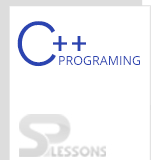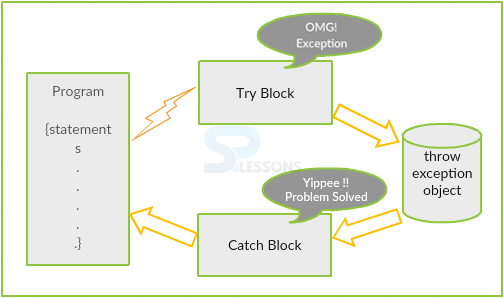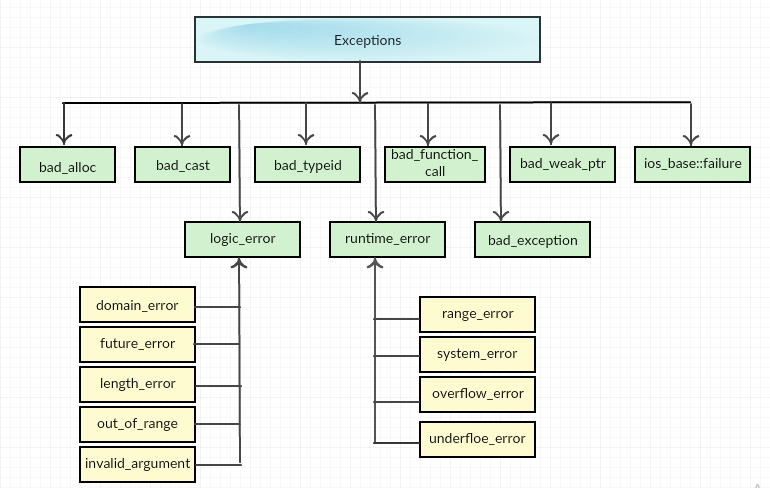 Introduction
Introduction
When a line of code executes, it might not work sometimes.Errors and failures occurring can be counted throughout the application. In fact, a large part of programming is reacting to that. But some of them are more predictable than others. If users are asked for values, an assumption has to be made at some point that every single user will do some or the other mistake. They might leave something blank that they're not suppose to leave blank. They might enter a letter where they are supposed to enter a number, those sorts of things.
There are other kinds of errors that are much less predictable, and it's arguable that testing for them constantly would put a performance hit on the application. So every time, when another piece of memory is allocated from the free store, memory has to be checked whether it is available or not.
Most of the time, checking these sorts of errors every single time is an actively bad thing to do which takes time and slows the application performance, and these things are really unusual, really kind of unexpected. And so that leads to a best practice that says different kinds of errors should be handled in different ways.
The best advantage in C++ when compared to C language is Exception handling. Basically, there are few errors which cannot be detected by the compiler. They are:
As these errors are not identified by the compiler, they are termed as "Exceptions". Exceptions occurs during the time of execution of the program.
- Run-time errors.
- Compile time errors.
- Errors occur at "run time" and "compile time" but, Exceptions occurs mostly at "run-time".
- Developer should detect the exception. Errors can be handled by the compiler.
 Description
Description
Exceptions are not the only way to handle errors, especially for expected errors. The best thing to do is to just test them. If the amount to be withdrawn is greater than the amount available for withdrawing, put up an error message, tell the user what they have done wrong right exactly where the problem is found. But the problem is that in some designs, some architectures, the code that actually finds the problem is a really long way away from anywhere that it can tell the user about the problem.
This is the real strength of exceptions. With Exception Handling in CPP, code can be written a lot cleaner with no checking of intermediate return values along the way between a place that can deal with a problem and a place where it might happen. When this very bad unexpected thing happens, it can be said that the exception is thrown.
Exception Handling in CPP can be done using three main blocks.
try : try block identifies the block of code which throws an exception disturbing the flow of program.
throw : throw makes an object consisting of list of all the exceptions produced by the functions and sends them to catch block.Throw block cannot handle the exceptions itself.
catch : catch block takes the exception and handles it by using exception handler and returns the control back to the program.
To know what exception occurred in a program, what() function can be used. For example, e.what() displays the exception occurred.  Syntax
Syntax
try
{
// protected code
}
catch( Exceptiontype e )
{
// alternative statements
}
 Example
Example
[c]
#include <iostream>
using namespace std;
int main()
{
int i = -1;
cout << "Before try \n";
try
{
cout << "Yes,exception occured "<< endl;
if (i < 0)
{
throw i;
cout << "After throwing exception (Never executed)" << endl;
}
}
catch (int i )
{
cout << "Exception is caught" << endl;
}
cout << "After catch block, you are back " << endl;
return 0;
}[/c]
Output
[c]
Before try
Yes,exception occured
Exception is caught
After catch block, you are back[/c]
 More Info
More Info
Multiple
catch blocks are allowed in a program if try block results in one or more exceptions. All these can be handled using a single "catch all" block. It can be represented as catch(...).  Example
Example
[c]
#include <iostream>
using namespace std;
int main()
{
try
{
throw 5;
}
catch (char* exception)
{
cout << "Caught exception " << exception;
}
catch (...) //handles any exception occured
{
cout << "Sorry,exception occured.But you are escaped!!!\n";
}
return 0;
}[/c]
Output
[c]
Sorry,exception occured.But you are escaped!!![/c]
 Description
Description
Instead of using try catch block, Exception Handling in CPP can be done using
throw keyword. The type for this expression can be determined by the operands involved in the exception code. The result obtained from the expression used will give the type of exception.
Eg:
int division(int x, int y)
{
if(y == 0 )
{
throw "Division by zero is not valid";
}
return (x/y);
}
 Example
Example
[c]
#include <iostream>
using namespace std;
int div(int x, int y)
{
if( y == 0 )
{
throw "Division by zero is not allowed";
}
return (x/y);
}
int main ()
{
int a = 5;
int b = 0;
int c = 0;
try
{
c = div(a, b);
cout << c << endl;
}
catch (const char* error)
{
cerr << error << endl;
}
return 0;
}[/c]
Output
[c]
Division by zero is not allowed[/c]
 Description
Description
C++ provides good number of built-in exceptions. The parent class for all the exception classes is
exception. This class can handle any exception occurred in the program.  Table
Table
Description for exceptions derived directly from exception class.
| Exceptions | Description |
|---|---|
| bad_alloc | Occurs when failure in memory allocation |
| bad_cast | Occurs when dynamic_cast is used incorrect |
| bad_typeid | Exception thrown by typeid function |
| bad_function_call | Exception thrown when an empty function is called |
| bad_weak_ptr | Exception thrown by share_ptr |
| ios_base::failure | Super class for all the stream exceptions |
| logic_error | Super class for some logic error exceptions |
| runtime_error | Super class for some runtime error exceptions |
| bad_exception | It handles unexpected exceptions in C++ |
 Example
Example
One can even override the functionality of existing exceptions and create own exceptions.
[c]
#include <iostream>
#include <exception>
using namespace std;
struct OwnException : public exception
{
const char* what () const throw ()
{
return "New exception";
}
};
int main()
{
try
{
throw OwnException();
}
catch(OwnException& e)
{
cout << "Exception is caught" << std::endl;
cout << e.what() << std::endl;
}
catch(exception& e)
{
//any otther exceptions
}
}[/c]
Output
[c]
Exception is caught
New exception[/c]
 Key Points
Key Points
The chapter Exception Handling in CPP draws out following important points.
- Errors stops the flow of program.
- try, throw and catch are performed for Exception Handling in CPP.





